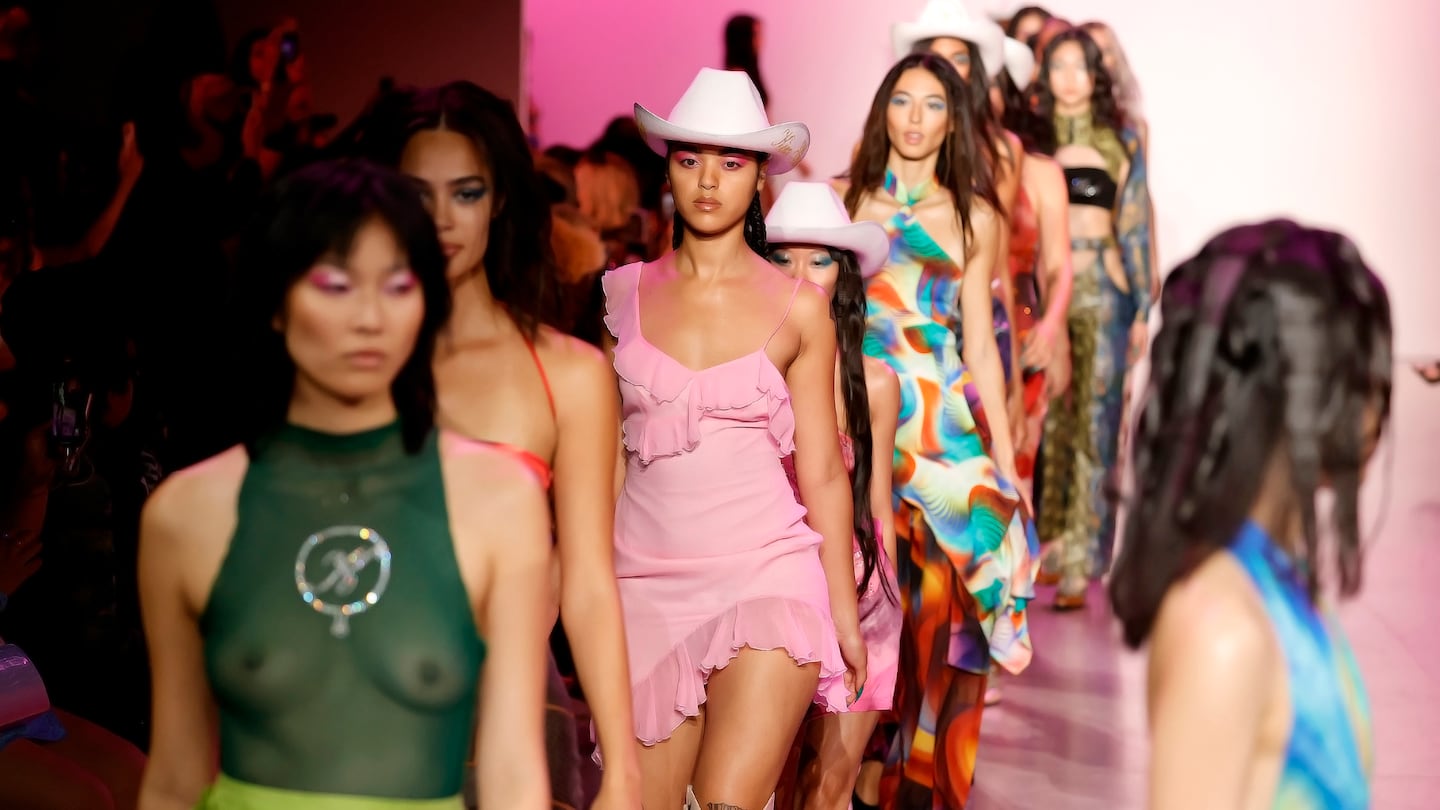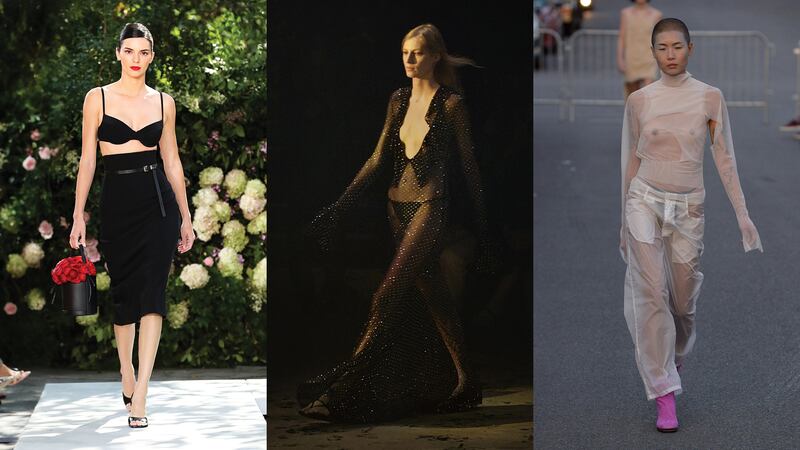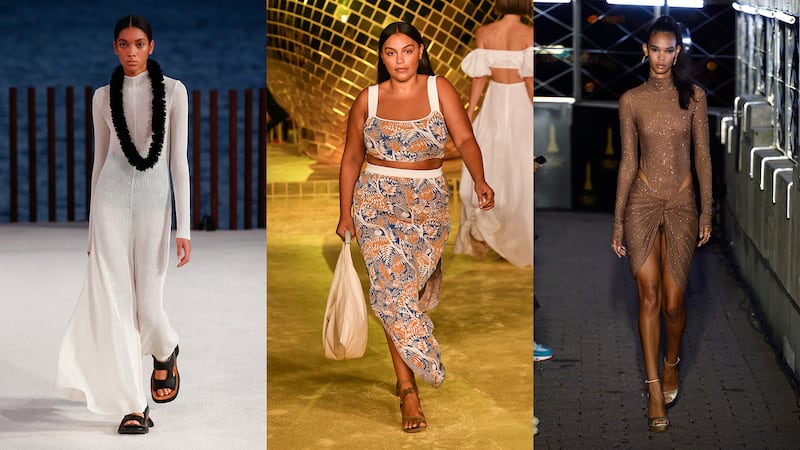
The Business of Fashion
Agenda-setting intelligence, analysis and advice for the global fashion community.

Agenda-setting intelligence, analysis and advice for the global fashion community.

All summer, April Hennig saw bodycon dresses, mini skirts and sheer tops fly off the virtual shelves at Moda Operandi, where she is chief merchant. After months of isolation, customers were hungry for flashy new outfits that expressed their new social freedom.
That’s why she wasn’t so surprised when she saw a slew of similarly revealing garments dominate the runway last week in New York. It was a classic case of art imitating life rather than the other way around. Designers try to steer the cultural conversation at fashion week, setting trends in motion that might play out over multiple seasons; but sometimes what the consumer wants is simply undeniable. Looks that fit the new skin-baring style, Hennig said, include Khaite’s showstopping finale, a glittery sheer black gown with a plunging neckline, and Laquan Smith’s opening piece, a tight nude-coloured dress with cutouts around the hips. Even at the Met Gala, racy attired dominated the red carpet, with looks such as Lorde’s front-open two-piece Bode set and Zoë Kravitz’s sheer bejewelled Saint Laurent gown. And in its latest marketing analysis, Edited noted cutouts as a major trend in fall 2021 — a detail that also happens to distinguish the work of the most recent LVMH Prize winner, Nensi Dojaka.
While not every runway trend makes it to stores, consumers should be able to buy into the sexiness on display at New York Fashion Week early next year, according to Hennig. “We’re already seeing a degree of commercial viability,” she said. For spring 2022, “we want to capitalise on things that are already performing well, like open backs, super tiny tops ... and strappy accents.”

It’s a stark departure from the sartorial narrative at the height of lockdown, when sweatpants sales soared and headlines bemoaned the end of fashion. Consumers returned to their pre-pandemic way of dressing — and then some — faster than many industry insiders expected. Already, US apparel sales in June and July have exceeded 2019 levels, and retailers like Moda, Neiman Marcus and Intermix have all noted their shoppers’ voracious appetite for bold — and in many cases, risqué — new styles.
ADVERTISEMENT
Even knitwear has become sexy, said Jyothi Rao, chief executive of Intermix. “Now, it’s about being much more body conscious and showing skin, and you’re seeing that across the board at the commercial level.” A standout look, for instance, was Alejandra Alonso Rojas’ dip-dyed body-hugging crochet dress in her spring 2022 collection.
“It’s a lot of skin,” Rao said.
A Cultural Shift
New York Fashion Week’s overt sexiness was perhaps the biggest common observation among spectators. Critic Cathy Horyn titled her roundup of shows, “At New York Fashion Week, Sex Is On Everyone’s Mind.” But if anything, fashion week reiterated, albeit artfully, a street style that’s already ubiquitous.
“I live in New York and walking around the city I just saw so many people wearing scarves as shirts and bras as tops,” said GQ fashion critic Rachel Tashjian. “A friend of mine has assless chaps she wore to the Luar show.”
But for Tashjian, the sexy attire isn’t as attention seeking as it is an expression of body positivity, an attitude she believes the pandemic welcomed.
“It’s done with an interesting attitude the way I’m seeing it on the streets — this kind of total relaxation and almost a nonchalance about the perfection or lack of perfections of one’s body,” Tashjian said. “During the opening stages of the pandemic, there was defeatism, where it was like ‘Who even cares what we look like?’ but that’s evolved into this type of exuberant attitude.”
For Tashjian, the standout collection was Eckhaus Latta, whose peekaboo cutouts and dramatic side slits were a playful twist in an overall sexy, gender neutral lineup.
ADVERTISEMENT
For Neiman Marcus fashion and lifestyle director Lisa Aiken too, the collections so far reflect a changing attitude among consumers.

“There was a strong message coming from the fashion industry right now around body confidence and body positivity and inclusiveness, and I think that is definitely paving the way for clients who feel great about the clothes they wear,” Aiken said.
During her walkthroughs with top clients this week, Aiken noticed they’re already gravitating toward crop tops and bralettes paired with pencil skirts — a recurring look in the Michael Kors show. Other standout moments to Aiken include sheer smocks at Proenza Schouler and Khaite, as well as Staud’s scanty, colourful linens.
I really just think there are no rules in fashion anymore.
At Khaite, Aiken said, the label will ship its sheer dresses with a lining underneath so that wearers have the option to be as revealing as they’d like. This sort of practicality will be a deciding factor too on the commercial resonance of certain sultry pieces.
Ultimately, designer approval or not, the consumer has already made up her mind: life’s too short to dress modestly — and retailers eagerly oblige.
“I really just think there are no rules in fashion anymore and in terms of what we wear,” Tashjian said. After the pandemic, she added, “we’re seeking change and connection, and we just can’t care about certain things anymore and one of those things is people judging our bodies.”
Related Articles:
Sex Is Back. Are Consumers Ready?
ADVERTISEMENT
Shopping Is Back but Where Are the New Clothes?
Designer brands including Gucci and Anya Hindmarch have been left millions of pounds out of pocket and some customers will not get refunds after the online fashion site collapsed owing more than £210m last month.
Antitrust enforcers said Tapestry’s acquisition of Capri would raise prices on handbags and accessories in the affordable luxury sector, harming consumers.
As a push to maximise sales of its popular Samba model starts to weigh on its desirability, the German sportswear giant is betting on other retro sneaker styles to tap surging demand for the 1980s ‘Terrace’ look. But fashion cycles come and go, cautions Andrea Felsted.
The rental platform saw its stock soar last week after predicting it would hit a key profitability metric this year. A new marketing push and more robust inventory are the key to unlocking elusive growth, CEO Jenn Hyman tells BoF.